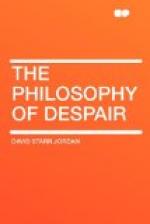A moment’s halt — a momentary taste
Of Being from the Well amid the waste,
And lo! — the phantom caravan has reach’d
The Nothing it set out from — O, make haste!
* * *
There was the door to which I found no key;
There was the veil through which I could not see:
Some little talk awhile of Me and Thee
There was — and then no more of Thee and Me.
* * *
Why, all the Saints and Sages who discuss’d
Of the two worlds so learnedly are thrust
Like foolish prophets forth; their words to scorn
Are scatter’d and their mouths are stopt with
dust.
With them the seed of wisdom did I sow,
And with my own hand wrought to make it grow
And this was all the harvest that I reap’d —
“I come like water, and like wind I go.”
* * *
Ah Love, could thou and I with Him conspire
To grasp this sorry scheme of Things entire,
Would we not shatter it to bits — and then
Re-mould it nearer to the heart’s desire!
Yon rising Moon that looks for us again —
How oft hereafter will she wax and wane;
How oft hereafter rising look for us
Through this same garden — and for one in vain!
And when like her, O Sáki, you shall pass
Among the guests, star-scattered on the grass,
And in your blissful errand reach the spot
Where I made one — turn down an empty glass!
* * *
And, again, in another poem from Carmen Silva’s Roumanian folk-songs:
Hopeless.
Into the mist I gazed, and fear came on me,
Then said the mist: “I weep for the lost
sun.”
We sat beneath our tent;
Then he that hath no hope drew near us there,
And sat him down by us.
We asked him: “Hast thou seen the plains,
the mountains?”
And he made answer: “I have seen them all.”
And then his cloak he showed us, and his shirt,
Torn was the shirt, there, close above the heart,
Pierced was the breast, there, close above the heart
—
The heart was gone.
And yet he trembled not, the while we looked,
And sought the heart, the heart that was not there.
He let us look. And he that had no hope
Smiled, that we grew so pale, and sang us songs.
Then we did envy him, that he could sing
Without a heart to suffer what he sang.
And when he went, he cast his cloak about him,
And those that met him, they could never guess
How that his shirt was torn about the heart,
And that his breast was pierced above the heart,
And that the heart was gone.
I gazed into the mist, and fear came on me,
Then said the mist: “I weep for the lost
sun.”
This poem of Omar and of Fitzgerald is perhaps our best expression of the sadness and the grandeur of insoluble problems. It is the sweetness of philosophical sorrow which has no kinship with misery or distress. In the strains of the saddest music the soul finds the keenest delight. The same sweet, sorrowful pleasure is felt in the play of the mind about the riddles which it cannot solve.




